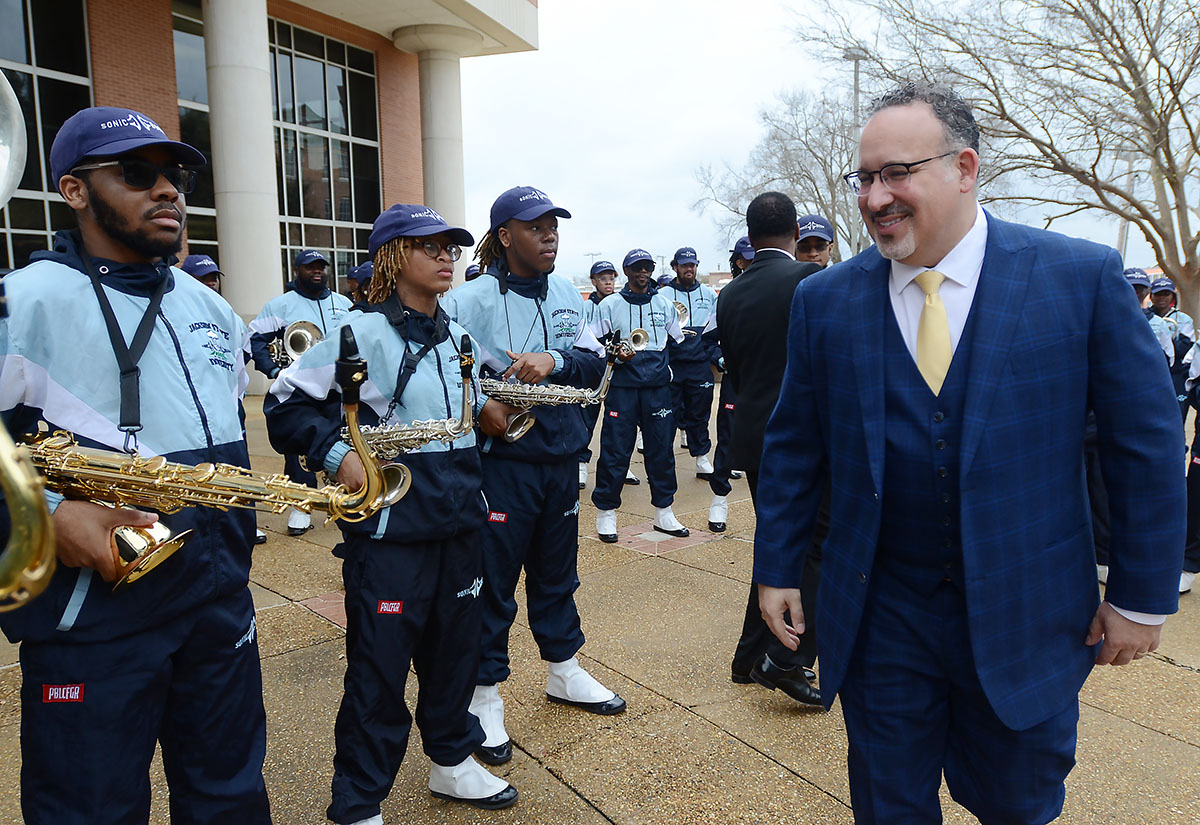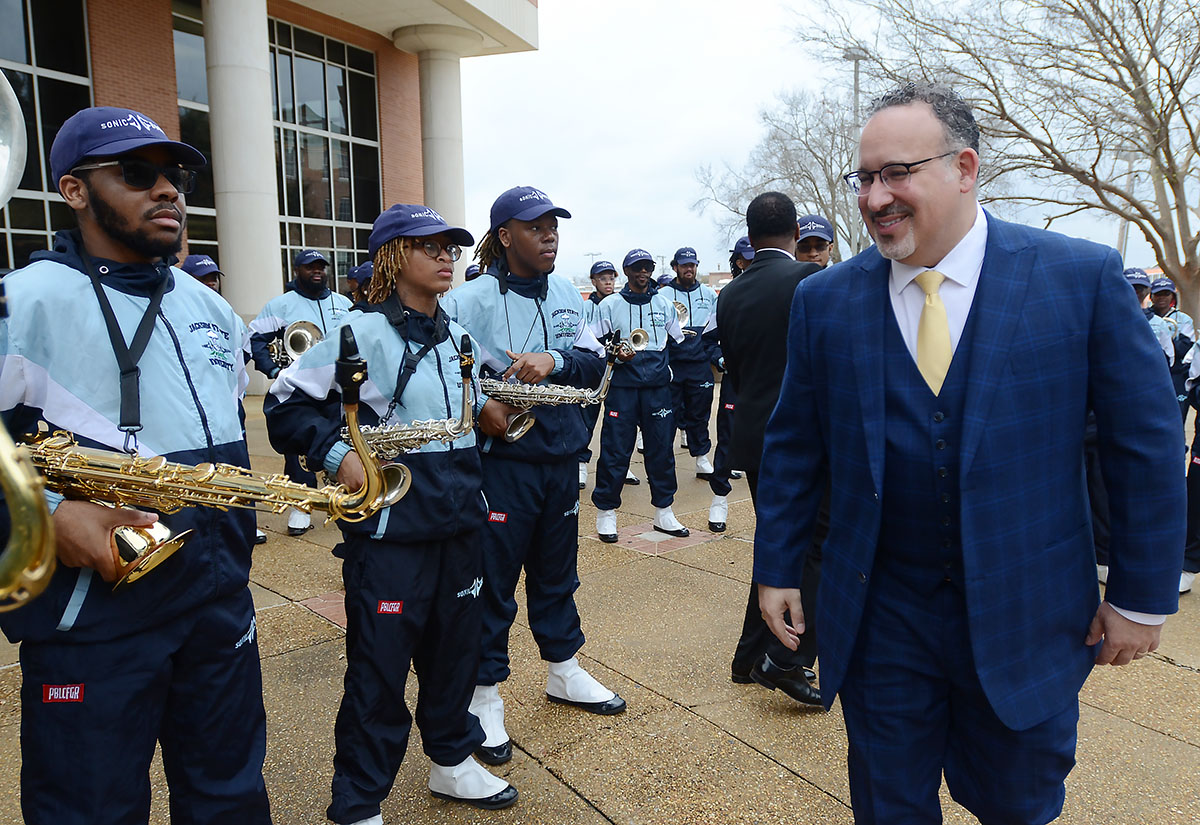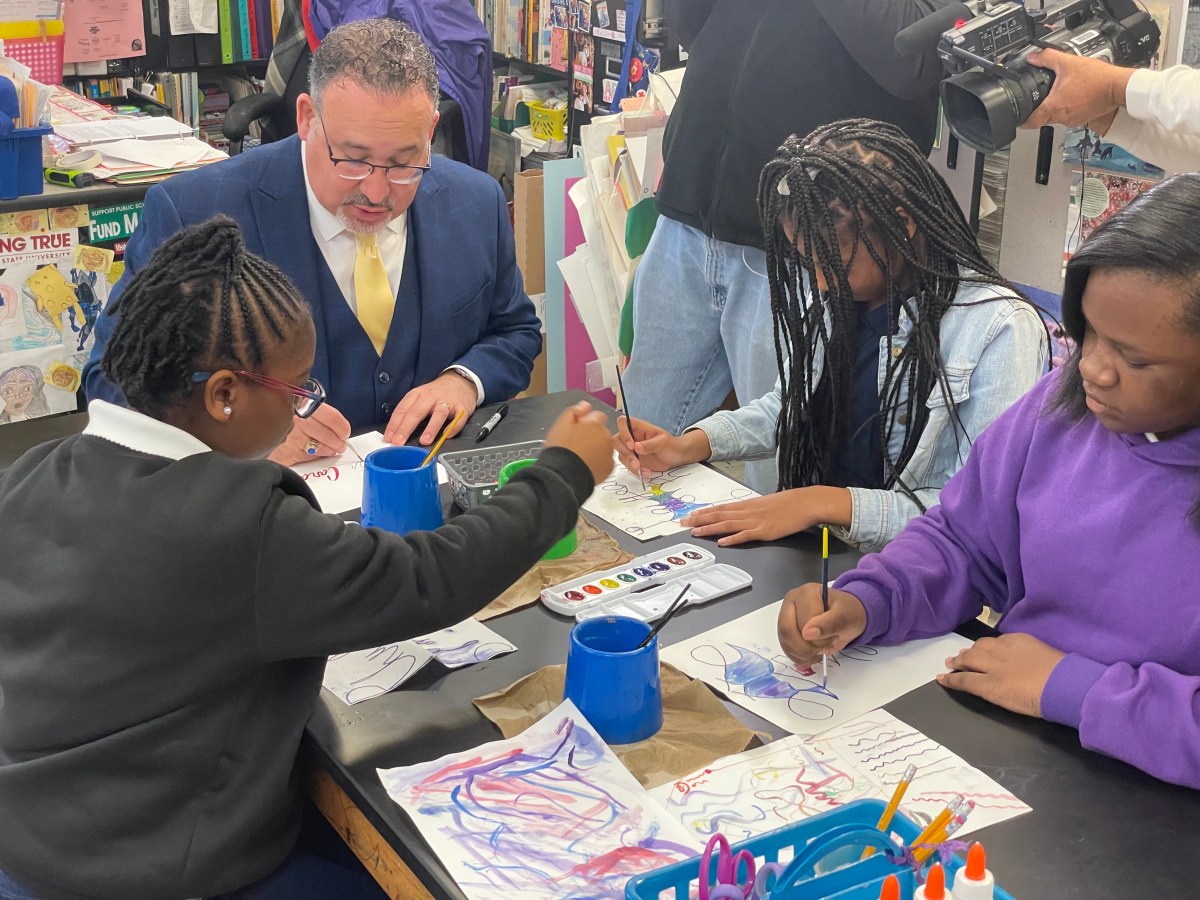Mississippi Today
U.S. Secretary of Ed visits Jackson schools to discuss pandemic relief funds, teacher shortages


U.S. Secretary of Ed visits Jackson schools to discuss pandemic relief funds, teacher shortages
U.S. Secretary of Education Miguel Cardona was in Jackson Wednesday to visit a local elementary school and Jackson State University to view the impact federal pandemic relief dollars are having in public schools and discuss the nation’s teacher shortage.
Cardona said he came to Jackson specifically because of the strong pipeline of Jackson State University graduates teaching in the Jackson Public School District.
“Jackson State University produces 67% of the Black teachers in Jackson Public Schools,” he said. “That’s unheard of. I’m here because I want all colleges and universities to have that impact on their local community.”
Speaking with education students at JSU, he said coming out of the pandemic, “the crisis is (no longer) safely reopening schools, it’s preparing tomorrow’s teachers.”
Statewide, there are nearly 2,600 certified teacher vacancies in Mississippi, a figure that the state has only recently started tracking. While some more specific data is available for the number of vacancies per subject or school level, the state does not publish district-specific vacancy data. The state does publish a list of geographic shortage areas, and the number of school districts on it has doubled since the 2019-20 school year.
READ MORE: Dept. of Ed reports nearly 2,600 teacher vacancies, a slight decrease from last year
Cardona touted the newly funded Augustus Hawkins grant program, which provides $18 million to historically Black colleges and universities to create high-quality teacher preparation programs for teachers of color. While Jackson State is not a recipient of the grant this year, he said he is aware that they are working to apply in the future.
When asking current education students how other universities can replicate Jackson State’s success in a “grow your own” program, a model that seeks to recruit and train community members to become teachers, students pointed to the high standards their professors have for them and the experiences collaborating in real-world settings.
Toy McLaurin, a speech-language pathology graduate student, called on current teaching students not to shy away from the areas that need them most.
“A lot of people veer away from going into schools that may have a high need for teachers or they may be considered low performing because people want to go where there’s more resources,” she said. “But sometimes you have to go there and start that culture. You have to go there and be the beginning of something great.”
Cardona repeatedly talked about collaborating with state and local leaders to raise teacher salaries “to make sure that, when you walk into this profession, it’s one where you can hold your head up high and there’s a level of respect.”
Last year, the Legislature passed the largest teacher pay raise in Mississippi history, raising the average salary by about $5,000 and increasing the base starting salary to $41,638. Even after that pay raise, Mississippi First found in a new report the number of teachers who left their district at the end of the 2021-22 school year still increased, with 23.7% of all teachers not returning. The report highlighted student debt specifically as increasing the risk of leaving the classroom, something Cardona said the Biden Administration is continuing to work on addressing.

Earlier in the day, Cardona visited Casey Elementary and spoke with community partners for the Jackson Public School District’s after-school programs, including the Greater Jackson Arts Council, the Mississippi Children’s Museum, and the Bean Path.
The representatives discussed the programming they have been able to create through the federal pandemic relief dollars, and State Superintendent of Education Robert Taylor emphasized the coming expiration of those funds in 2024 as a major concern for school districts across the state.
READ MORE: How three Mississippi school districts are spending $207 million in federal relief funds
In response, Cardona called on governors and legislatures to see the benefits of that federal investment and provide funding for these resources to continue.
“The American Rescue Plan was a down payment on transformational change,” Cardona said. “It is not intended to make up for decades of underinvestment in education.”
This article first appeared on Mississippi Today and is republished here under a Creative Commons license.
Mississippi Today
On this day in 1939, Billie Holiday recorded ‘Strange Fruit’

April 20, 1939

Legendary jazz singer Billie Holiday stepped into a Fifth Avenue studio and recorded “Strange Fruit,” a song written by Jewish civil rights activist Abel Meeropol, a high school English teacher upset about the lynchings of Black Americans — more than 6,400 between 1865 and 1950.
Meeropol and his wife had adopted the sons of Julius and Ethel Rosenberg, who were orphaned after their parents’ executions for espionage.
Holiday was drawn to the song, which reminded her of her father, who died when a hospital refused to treat him because he was Black. Weeks earlier, she had sung it for the first time at the Café Society in New York City. When she finished, she didn’t hear a sound.
“Then a lone person began to clap nervously,” she wrote in her memoir. “Then suddenly everybody was clapping.”
The song sold more than a million copies, and jazz writer Leonard Feather called it “the first significant protest in words and music, the first unmuted cry against racism.”
After her 1959 death, both she and the song went into the Grammy Hall of Fame, Time magazine called “Strange Fruit” the song of the century, and the British music publication Q included it among “10 songs that actually changed the world.”
David Margolick traces the tune’s journey through history in his book, “Strange Fruit: Billie Holiday and the Biography of a Song.” Andra Day won a Golden Globe for her portrayal of Holiday in the film, “The United States vs. Billie Holiday.”
This article first appeared on Mississippi Today and is republished here under a Creative Commons Attribution-NoDerivatives 4.0 International License.![]()
Mississippi Today
Mississippians are asked to vote more often than people in most other states

Not long after many Mississippi families celebrate Easter, they will be returning to the polls to vote in municipal party runoff elections.
The party runoff is April 22.
A year does not pass when there is not a significant election in the state. Mississippians have the opportunity to go to the polls more than voters in most — if not all — states.
In Mississippi, do not worry if your candidate loses because odds are it will not be long before you get to pick another candidate and vote in another election.
Mississippians go to the polls so much because it is one of only five states nationwide where the elections for governor and other statewide and local offices are held in odd years. In Mississippi, Kentucky and Louisiana, the election for governor and other statewide posts are held the year after the federal midterm elections. For those who might be confused by all the election lingo, the federal midterms are the elections held two years after the presidential election. All 435 members of the U.S. House and one-third of the membership of the U.S. Senate are up for election during every midterm. In Mississippi, there also are important judicial elections that coincide with the federal midterms.
Then the following year after the midterms, Mississippians are asked to go back to the polls to elect a governor, the seven other statewide offices and various other local and district posts.
Two states — Virginia and New Jersey — are electing governors and other state and local officials this year, the year after the presidential election.
The elections in New Jersey and Virginia are normally viewed as a bellwether of how the incumbent president is doing since they are the first statewide elections after the presidential election that was held the previous year. The elections in Virginia and New Jersey, for example, were viewed as a bad omen in 2021 for then-President Joe Biden and the Democrats since the Republican in the swing state of Virginia won the Governor’s Mansion and the Democrats won a closer-than-expected election for governor in the blue state of New Jersey.
With the exception of Mississippi, Louisiana, Kentucky, Virginia and New Jersey, all other states elect most of their state officials such as governor, legislators and local officials during even years — either to coincide with the federal midterms or the presidential elections.
And in Mississippi, to ensure that the democratic process is never too far out of sight and mind, most of the state’s roughly 300 municipalities hold elections in the other odd year of the four-year election cycle — this year.
The municipal election impacts many though not all Mississippians. Country dwellers will have no reason to go to the polls this year except for a few special elections. But in most Mississippi municipalities, the offices for mayor and city council/board of aldermen are up for election this year.
Jackson, the state’s largest and capital city, has perhaps the most high profile runoff election in which state Sen. John Horhn is challenging incumbent Mayor Chokwe Antar Lumumba in the Democratic primary.
Mississippi has been electing its governors in odd years for a long time. The 1890 Mississippi Constitution set the election for governor for 1895 and “every four years thereafter.”
There is an argument that the constant elections in Mississippi wears out voters, creating apathy resulting in lower voter turnout compared to some other states.
Turnout in presidential elections is normally lower in Mississippi than the nation as a whole. In 2024, despite the strong support for Republican Donald Trump in the state, 57.5% of registered voters went to the polls in Mississippi compared to the national average of 64%, according to the United States Elections Project.
In addition, Mississippi Today political reporter Taylor Vance theorizes that the odd year elections for state and local officials prolonged the political control for Mississippi Democrats. By 1948, Mississippians had started to vote for a candidate other than the Democrat for president. Mississippians began to vote for other candidates — first third party candidates and then Republicans — because of the national Democratic Party’s support of civil rights.
But because state elections were in odd years, it was easier for Mississippi Democrats to distance themselves from the national Democrats who were not on the ballot and win in state and local races.
In the modern Mississippi political environment, though, Republicans win most years — odd or even, state or federal elections. But Democrats will fare better this year in municipal elections than they do in most other contests in Mississippi, where the elections come fast and often.
This article first appeared on Mississippi Today and is republished here under a Creative Commons Attribution-NoDerivatives 4.0 International License.
Mississippi Today
On this day in 1977, Alex Haley awarded Pulitzer for ‘Roots’

April 19, 1977

Alex Haley was awarded a special Pulitzer Prize for “Roots,” which was also adapted for television.
Network executives worried that the depiction of the brutality of the slave experience might scare away viewers. Instead, 130 million Americans watched the epic miniseries, which meant that 85% of U.S. households watched the program.
The miniseries received 36 Emmy nominations and won nine. In 2016, the History Channel, Lifetime and A&E remade the miniseries, which won critical acclaim and received eight Emmy nominations.
This article first appeared on Mississippi Today and is republished here under a Creative Commons Attribution-NoDerivatives 4.0 International License.![]()
-

 News from the South - Alabama News Feed6 days ago
News from the South - Alabama News Feed6 days agoFoley man wins Race to the Finish as Kyle Larson gets first win of 2025 Xfinity Series at Bristol
-

 News from the South - Alabama News Feed6 days ago
News from the South - Alabama News Feed6 days agoFederal appeals court upholds ruling against Alabama panhandling laws
-

 News from the South - Florida News Feed7 days ago
News from the South - Florida News Feed7 days agoJacksonville University only school with 2 finalist teams in NASA’s 2025 Human Lander Challenge
-

 News from the South - North Carolina News Feed5 days ago
News from the South - North Carolina News Feed5 days agoFDA warns about fake Ozempic, how to spot it
-

 News from the South - Virginia News Feed4 days ago
News from the South - Virginia News Feed4 days agoLieutenant governor race heats up with early fundraising surge | Virginia
-

 News from the South - Missouri News Feed5 days ago
News from the South - Missouri News Feed5 days agoAbandoned property causing issues in Pine Lawn, neighbor demands action
-

 News from the South - Oklahoma News Feed3 days ago
News from the South - Oklahoma News Feed3 days agoThursday April 17, 2025 TIMELINE: Severe storms Friday
-

 News from the South - Arkansas News Feed6 days ago
News from the South - Arkansas News Feed6 days agoTwo dead, 9 injured after shooting at Conway park | What we know


















































